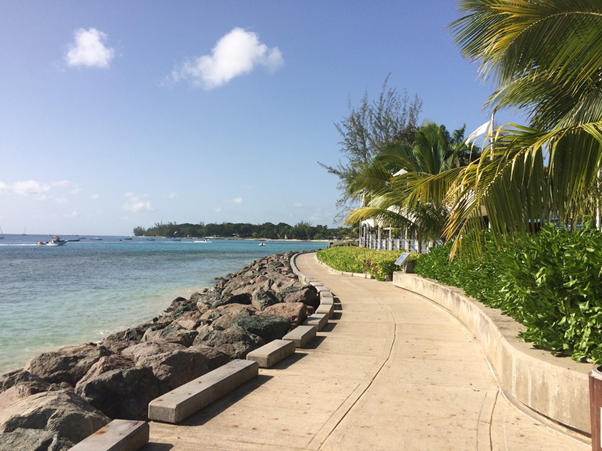 Sandy was born in Barbados before going to University in the UK. She worked in local Government for 39 years, including at Stockport Council where she was a Service Director, before returning to Barbados in 2008. Since returning she has undertaken consultancy work for the Government of Barbados culminating in a comprehensive review and redrafting of planning legislation. Sandy is a member of the Barbados Town Planning Society and a Chartered Member of the RTPI.
Sandy was born in Barbados before going to University in the UK. She worked in local Government for 39 years, including at Stockport Council where she was a Service Director, before returning to Barbados in 2008. Since returning she has undertaken consultancy work for the Government of Barbados culminating in a comprehensive review and redrafting of planning legislation. Sandy is a member of the Barbados Town Planning Society and a Chartered Member of the RTPI.
Barbados is a small Caribbean island (a mere 166 square miles and a population of under 300,000) yet we are playing a key role on the global stage taking forward the climate agenda.
We did nothing to create the climate crisis but, like many other small island developing states, we are in the front-line of the battle. Although we have ambitious targets to reach 100% renewable energy by 2030, nothing we do to reduce carbon emissions will make any difference to the problem.
So what can we do?
- Moan about climate justice and wait for the “big boys” in the developed North to wake up and do what is necessary; or
- Push forward the agenda globally while at the same time carrying out adaptations to try and preserve our very existence.
As a relatively low-lying island heavily dependent on coastal tourism we have very little choice but to take action now and use what influence we have to make sure that the financial resources promised are delivered in a way that countries like ours can afford. We also need to make sure that when extreme weather events devastate us, we are not left with crippling debt burdens which put us back decades.
Barbados may be small, but it is not scared to question the conventional wisdom and whether the current financial institutions set up after Word War II are fit for purpose in our changing world. Our Prime Minister – Mia Amor Mottley - has been centre stage at COP 26 and 27 and is leading the charge on behalf of the developing world to initiate change.
The Bridgetown Initiative, which proposes mechanisms for setting up a $500 Billion Global Climate Change Trust with Special Drawing Rights funding the transition to renewables and adaptations in a way that allows access to affordable money, is gaining a great deal of traction with multi-national institutions and many developed countries.
While we lobby for these funding changes, we need to press forward urgently with planning for a different country that is resilient and can cope with a future of rising sea levels and more extreme weather.
Spatial Planning has a critical role to play, providing a structure for land use changes through the Physical Development Plan and the management of development in vulnerable locations.
The Barbados Physical Development Plan is currently under review to ensure that it adequately addresses the climate crisis. However, the existing plan already includes policies on coastal development which inform the decision-making process.
The Integrated Coastal Zone Management Plan (which sits alongside the Physical Development Plan) provides a detailed analysis of the coastline providing recommended setbacks for development, advice on making buildings more resilient and protecting marine life and our reefs and beaches. Each planning application on the coast is referred to the Coastal Zone Management Unit for advice. Planning conditions include the setback for buildings, the location of habitable rooms and guidance on lighting to protect turtle nesting sites. Sea defence works are carefully modelled to ensure that structures erected in one area do not adversely affect other beaches or have unanticipated adverse consequences.
The Coastal Zone Management Unit has also delivered a number of very successful projects. Notable among these is multi-purpose sea defence works. Not only do these structures provide a barrier to storm surges, improve drainage and nourish and improve beaches, but they take the form of a boardwalk which provides a coastal footpath. This is well used by tourists and local communities alike and supports health benefits and exercise.

A coastal footpath elegantly forms part of the islands coastal defences
Barbados has demonstrated that, given the resources, we can use them effectively in a way that will mitigate the impacts of sea level rise and storm surges, protect coastal property and support our economy.
However, there is no time to waste. I would urge readers to find out more about the Bridgetown Initiative and support its thrust of making sure that funding which has been promised for decades is actually delivered in a way that low and middle income countries can afford.


